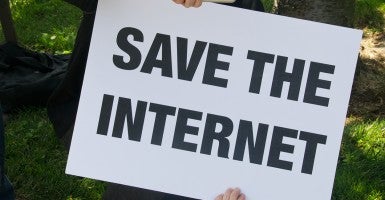Free-market groups are raising concerns about a proposed government regulation that would “break” the Internet.
With major tech companies flooding the Internet with messages encouraging Americans to support net neutrality, groups opposed to the regulation are speaking out as well, voicing their concerns to the Federal Communications Commission.
The FCC imposed net neutrality rules twice in 2008 and 2010, but the regulations were overturned in court in 2010 and earlier this year. Now, for a third time, the agency is trying again—and the proposal goes even farther than the previous two.
TechFreedom, a non-partisan think tank focused on technology policy, used the FCC’s invitation for comments to voice its vehement opposition to common carrier regulations on the Internet and to spread the word about its “Don’t Break the Net” web campaign.
In a press release Tuesday, TechFreedom President Berin Szoka said the goal was to debunk three myths about Title II of the 1996 Telecommunications Act:
A radical fringe has dressed up a government takeover of the Internet as ‘net neutrality.’ Google, Facebook, and the NAACP haven’t jumped on the Title II bandwagon, because they know better. Imposing public utility regulations on the Internet won’t create net neutrality, but the heavy hand of government will crush innovation and investment in broadband.
TechFreedom was joined by the International Center for Law and Economics. Geoffrey Manne, the center’s executive director, added, “Subjecting broadband to Title II would not even allow the FCC to do the one thing that most Net Neutrality supporters want: banning ‘paid prioritization.’”
James Gattuso, senior research fellow in regulatory policy at The Heritage Foundation, has maintained similar beliefs, arguing that the Internet operates best when providers are not subjected to cumbersome regulations and remain free to “charge content providers differing amounts for quality of service or transmission speeds.
“Almost every economic market offers some level of differentiated service at discount and premium rates. Airline passengers can fly coach or first class; sports fans choose between box seats or grandstand benches; cable service can be basic or enhanced tier. Paying more—or less—for a product or service according to the quality and quantity received is … a sign of a healthy, diverse marketplace, not an unfair marketplace,” Gattuso wrote.
Gattuso also said the proposed reclassification under Title II would result in an antiquated system of regulation “like railroads during the 20th century or local water companies today,” which is “hardly an appropriate model for a dynamic and ever-evolving technology like the Internet.”
Most Americans agree, according to a recent survey by the tech advocacy group CALinnovates. Sixty-eight percent of respondents said laws written decades ago for the telephone system aren’t adequate for dealing with the Internet.
Last week, companies such as Reddit, Netflix and Etsy joined the Massachusetts-based activist group Fight for the Future in an online campaign in support of the expansion and reinstatement of net neutrality.





























